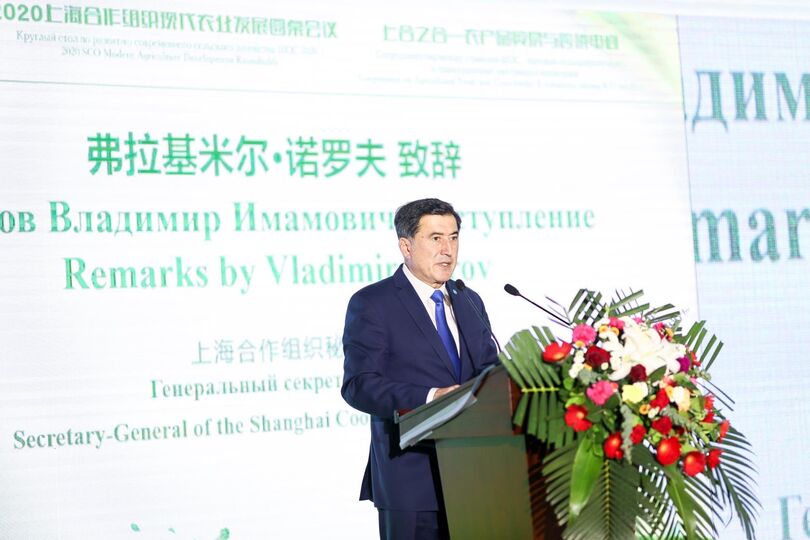On 22 October 2020, Yangling hosted a roundtable. The discussion was attended by heads of agricultural discussion on SCO Member States Cooperation: Agricultural Produce Trade and Transborder Trade, held as part of the 27th China Yangling Agricultural Hi-Tech Fair.ministries and agencies from Kyrgyzstan, Pakistan, Russia, Tajikistan, Azerbaijan, Armenia, Afghanistan, Belarus, Iran, Mongolia and Cambodia.
The meeting was moderated by SCO Deputy Secretary-General Sherali Jonon.
In his address, SCO Secretary-General Vladimir Norov noted the pandemic-related difficult situation in the world and its negative impact on states' socioeconomic development and food security in particular.
"Today, food security and sources of livelihood for millions of people all over the world depend on the efficiency of agricultural production and international food trade.
"The SCO countries, where rural population accounts for 52.6 percent, or 1.7 billon people, have faced a number of pandemic-related problems involved in agricultural production and producer-to-consumer transportation," he said.
"A green corridor needs to be created for freight transit to ensure unimpeded agricultural and food exports and imports. In this context, states must focus on drafting legal instruments designed to harmonise sanitary and phytosanitary standards and requirements; deal with the certification and customs barriers; and create a network of product inspectorates to take care of testing and certification in the SCO countries," Vladimir Norov stressed.
World trade in the COVID-19 environment has promoted the development of digital economy and e-commerce, taking the transborder e-trade in food to the highest level ever. Currently, digital economy accounts for about 20 percent of world trade and is likely to grow to 25 percent by 2025. In this connection, the Secretary-General suggested devising an SCO cooperation programme based on China's record of promoting transborder e-trade as a whole.
It is important to hold practical exchanges, consultations and training workshops aimed at finding and introducing innovative solutions, enhancing the SCO's export potential, and entering each other's markets. In this context, Mr Norov mentioned the meeting of the SCO agriculture ministers held on 21 October 2020, which endorsed China's initiative to establish an SCO demonstration centre in Yangling to exchange and train agricultural know-how.
Commenting on its prospects, Secretary-General Norov expressed certainty that "it will be of much help for the further development of modern smart agriculture and, most importantly, to digitalising agriculture, establishing agriculture clusters and agro-parks, producing environmentally friendly and organic products, rational use of water resources, introducing advanced technologies in this area, and training and retraining specialists."
Mr Norov also noted the importance of the SCO countries' practical collaboration with the UN Food and Agriculture Organisation (FAO), expressing certainty that the pooling of SCO efforts with the FAO potential will provide an additional impetus to the development of the SCO's innovative agriculture.
In summing up, Secretary-General Norov pointed to the significance of the upcoming Russia-chaired SCO Summit scheduled for 10 November 2020.
"In the current environment, Russia's SCO chairmanship is difficult, and simultaneously successful. It has managed to reformat operations of a number of main industry-specific mechanisms and draw up a large package of documents regulating a number of important short- and medium-term political and economic solutions.
"For the first time, the Summit will be held via videoconference, but there is no doubt that it will be prepared at the highest level and that its results will make it possible to strengthen trade and economic collaboration between the SCO member countries, remove trade barriers and eventually promote the region's stable development and improve the quality of life of our peoples," Vladimir Norov said in conclusion.
Deputy Secretary of the CPC Party Committee and Governor of the People's Government of Shaanxi Province Zhao Yide welcomed the participants and thanked the SCO Secretariat for joining the effort to organise the roundtable discussion. He mentioned Saanxi's economic achievements as a leading agricultural region of China and a trade and logistics hub. The Yangling region is a national demonstration area of the agricultural hi-tech industry that cultivates agricultural scientific and technological innovations, promotes technologies, transforms results, trains farmers, and develops modern agriculture in arid and semi-arid areas. President Xi Jinping's initiative to establish in Yangling the SCO's demonstration infrastructure for agricultural technology exchanges and training will assist the digital transformation of agricultural trade, logistics, scientific exchanges, advancement of agricultural and information technologies, and cooperation of industrial capacities under the new conditions. The Governor regards the roundtable discussion as an "opportunity for further intensifying the communications and pragmatic cooperation with the SCO member states."
Participants in the roundtable discussion also came up with proposals on promoting agricultural cooperation and exchanging views on all aspects of modern agricultural development.
